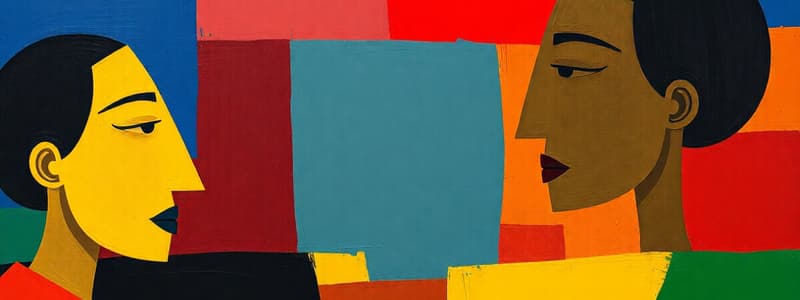Podcast
Questions and Answers
What role does literature play in the concept of Orientalism?
What role does literature play in the concept of Orientalism?
- It becomes an instrument of imperial power. (correct)
- It is used to promote historical accuracy.
- It serves primarily as a source of entertainment.
- It acts as a tool for fostering genuine cultural exchange.
How does Orientalism treat diverse cultures according to the provided content?
How does Orientalism treat diverse cultures according to the provided content?
- It treats them as a sophisticated collective.
- It emphasizes the uniqueness of each culture.
- It promotes mutual understanding among cultures.
- It reduces them to an unsophisticated collective. (correct)
What are some consequences of Orientalist attitudes today?
What are some consequences of Orientalist attitudes today?
- Increased appreciation for Eastern philosophies.
- Racism and stereotypical representation of Muslims. (correct)
- A decline in cultural differences worldwide.
- Enhanced cooperation between Western and non-Western countries.
What does the concept of Orientalism imply about Western perspectives on non-Western cultures?
What does the concept of Orientalism imply about Western perspectives on non-Western cultures?
What is suggested about the systems of knowledge imposed by colonial powers?
What is suggested about the systems of knowledge imposed by colonial powers?
What dimension of Orientalism is related to the scientific study of Eastern cultures and customs?
What dimension of Orientalism is related to the scientific study of Eastern cultures and customs?
How does Edward Said describe the relationship between the West and the Orient?
How does Edward Said describe the relationship between the West and the Orient?
Which aspect of colonialism does Frantz Fanon focus on?
Which aspect of colonialism does Frantz Fanon focus on?
What is the term used to describe the 'inherently inferior' image of the colonized in postcolonial studies?
What is the term used to describe the 'inherently inferior' image of the colonized in postcolonial studies?
What role do 'experts' play in the construction of Orientalism, according to Edward Said?
What role do 'experts' play in the construction of Orientalism, according to Edward Said?
What does Said suggest is a consequence of Orientalism in terms of power dynamics?
What does Said suggest is a consequence of Orientalism in terms of power dynamics?
Which term is associated with Gayatri Spivak's work on representation and voice in postcolonial theory?
Which term is associated with Gayatri Spivak's work on representation and voice in postcolonial theory?
According to the content, how is the Oriental characterized in contrast to the Western view?
According to the content, how is the Oriental characterized in contrast to the Western view?
What does the concept of 'imaginative geography' describe?
What does the concept of 'imaginative geography' describe?
Which characteristic is typically associated with the Oriental in contrast to the Western representation?
Which characteristic is typically associated with the Oriental in contrast to the Western representation?
In the context of colonial discourse, how is the native often depicted?
In the context of colonial discourse, how is the native often depicted?
What does the term 'Othering' refer to in the context of colonization?
What does the term 'Othering' refer to in the context of colonization?
Which of the following concepts relates to the feminization of the Orient?
Which of the following concepts relates to the feminization of the Orient?
According to the colonial narrative, what perception is held of the native’s societal values?
According to the colonial narrative, what perception is held of the native’s societal values?
Which aspect is NOT typically attributed to the 'Orient' in contrast to the 'West'?
Which aspect is NOT typically attributed to the 'Orient' in contrast to the 'West'?
What visual motifs are commonly associated with the 19th-century Orientalist art movement?
What visual motifs are commonly associated with the 19th-century Orientalist art movement?
Flashcards
Orientalism
Orientalism
A system of thought and representation of the 'Orient' (primarily the Middle East and Asia) from a European perspective. It's often a biased and inaccurate portrayal, used to justify and promote European power.
Mythical Representation
Mythical Representation
An inaccurate or idealized portrayal of the 'Orient', constructed and used by Europeans to promote their own interests. It ignores the diversity of cultures.
Imperial Power
Imperial Power
The ability of one nation or group to control and dominate others, often achieved through cultural, economic, or military means. In Orientalism, it used exaggerated depictions of Eastern cultures to promote their perceived superiority.
Colonial-era Knowledge/Discourse
Colonial-era Knowledge/Discourse
Signup and view all the flashcards
Postcolonial Studies
Postcolonial Studies
Signup and view all the flashcards
Imaginative Geography
Imaginative Geography
Signup and view all the flashcards
Orientalist Representation of the East
Orientalist Representation of the East
Signup and view all the flashcards
"Othering" of Colonized Peoples
"Othering" of Colonized Peoples
Signup and view all the flashcards
Colonial Exploitation
Colonial Exploitation
Signup and view all the flashcards
Orientalist Movement
Orientalist Movement
Signup and view all the flashcards
The East vs The West
The East vs The West
Signup and view all the flashcards
Stereotypes of the East
Stereotypes of the East
Signup and view all the flashcards
Colonial mindset
Colonial mindset
Signup and view all the flashcards
Edward Said
Edward Said
Signup and view all the flashcards
Colonized 'Other'
Colonized 'Other'
Signup and view all the flashcards
"The Orient"
"The Orient"
Signup and view all the flashcards
Knowledge/Power Dynamic
Knowledge/Power Dynamic
Signup and view all the flashcards
Frantz Fanon
Frantz Fanon
Signup and view all the flashcards
Gayatri Spivak
Gayatri Spivak
Signup and view all the flashcards
Study Notes
Foundations of Sociological Thought: Poststructuralism (2)
- Edward Said (1935-2003) was a Palestinian-American literary theorist and professor at Columbia University, considered a foundational figure in postcolonial theory.
- Key works include Joseph Conrad and the Fiction of Autobiography (1966), Beginnings: Intention and Method (1974), Orientalism (1978), The World, the Text, and the Critic (1983), and Culture and Imperialism (1993).
Postcolonial Studies
- Postcolonial studies explore power dynamics arising from colonial conquests and their long-term effects.
- They examine the psychological impact of colonialism on both colonizers and colonized.
- They analyze how colonizing powers utilize language to define and categorize the colonized "Other."
- Key precursors include Frantz Fanon (1925-1961) and Gayatri Spivak (1942–). Spivak's 1988 work, "Can the subaltern speak?", is significant in this context.
The Other
- Colonization portrays the colonized as inherently inferior, weak, and evil.
- This focus on the "Other" diverts attention from the colonizers to the colonized (ADE 2021).
- The "West" (Occident) defines itself in opposition to "the Orient."
- Fanon's work highlights the psychological dimensions of colonialism.
Dimensions of Orientalism
- Orientalism encompasses academic disciplines studying "Oriental" cultures and customs (ADE 2021).
- It also includes the style of thought characterized by ideological suppositions, images, and fantasies concerning the Orient (Said, 2000).
- Orientalism served as a source of power for dominating, restructuring, and asserting authority over the Orient (Said, 1978).
Orientalism as Knowledge and Power
- Orientalism constructs the Orient as a mythical place using an "imaginative geography" created by experts (politicians, diplomats, writers, painters, scholars).
- It utilizes a vocabulary of images and notions of Asian inscrutability, legitimized by various experts, which portrays the Orient as exotic, sensual, irrational, childlike and lacking sophistication; savage and barbaric in opposition to the West (Said, 1978).
- Foucault's concept of the relationship between knowledge and power is relevant in this context.
- Cromer (cited in ADE 2021) describes Europeans as precise and logical, in contrast to the Orientals, who are deemed intellectually sloppy.
Imaginative Geographies
- Imaginative geographies are the mental representations of space, encompassing familiarity and unfamiliarity, arbitrary boundaries, and distinctions between "ours" and "theirs."
- There's a relationship between knowledge and geography.
Orientalist Representation of "The East"
- The "Oriental" is often portrayed as irrational, infantile, uncivilized, lazy, and irresponsible.
- The Orient can be feminized, emphasizing sensuality and portraying the Orientals as submissive and passive, in contrast to the "masculine" and aggressive West.
The "Othering" of the Colonized
- Colonization depicts the native as the epitome of evil.
- Indigenous societies are presented as lacking values and ethics.
- The native is viewed as the enemy of values and absolute evil (Fanon, 1961).
- The concept of othering aims to justify exploitation.
The "Orient" as Europe's Other
- The East (Orient) is viewed as inferior, unintelligent, and infantile compared to the West.
- Western cultures are perceived as superior, rational, mature, and civilized.
- Descriptions of the East include savage, uncivilized, exotic, sensual, feminine and passive. Descriptions of the West include superior, simple, rational, mature, civilized, and masculine, aggressive.
Orientalist Movement in 19th Century Art
- Orientalist art depicts stereotypical images of the Arab world, reinforcing prevalent stereotypes.
- Images include harems, fezes, monkeys, and long shisha pipes.
- The 19th-century art movement is responsible for these depictions.
Orientalism as a Myth
- Orientalism creates a mythical and fictitious, yet powerful, representation of the Orient for the benefit of Europe.
- Literature and art become instruments of imperial power, reflecting a Foucaultian knowledge/power dynamic.
- Empirical truth and local perspectives are deemed irrelevant.
- Diverse cultures are treated as a single, unsophisticated collective.
Orientalism Today
- Orientalism remains a mechanism/attitude, extending beyond the Orient to encompass cultural and social differences.
- The "West" or "global North" acts as a benchmark of "civilization."
- Modern forms of Orientalism manifest in racism, stereotypical portrayals of Muslims (e.g., as terrorists), and anxieties about the cohesion of European states.
Summary
- Postcolonial studies emphasize uncovering imperialist and colonial power.
- Colonial powers established systems of knowledge and discourse, silencing colonized subjects.
- Orientalism, as a system of thought, comprises ideas and representations of the "Other."
- Literature functioned as a tool for imperial and colonial expansion.
Studying That Suits You
Use AI to generate personalized quizzes and flashcards to suit your learning preferences.



